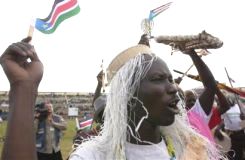Illiteracy fails to impair south Sudanese sight on secession vote
April 3, 2006 (JUBA) — Despite high-level illiteracy in southern Sudan, residents here have kept clear focus on a watershed referendum vote in five years on whether to secede or remain under central rule from Khartoum.
 Nearly 80 percent of the region’s 10 million people are illiterate, according to the UN children’s agency, yet many who are of voting age are eager to cast their ballots in the landmark 2011 referendum, which is part of the Comprehensive Peace Agrement (CPA) signed last year in neighbouring Kenya.
Nearly 80 percent of the region’s 10 million people are illiterate, according to the UN children’s agency, yet many who are of voting age are eager to cast their ballots in the landmark 2011 referendum, which is part of the Comprehensive Peace Agrement (CPA) signed last year in neighbouring Kenya.
“We are sure that lack of education among the people will affect us,” the region’s Education Minister Michael Milli Hussein told AFP at the sidelines of a massive education drive by UNICEF in the south Sudanese capital of Juba over the weekend.
Milli said that authorities have set aside 140 million dollars (115 million euros) to boost education, an essential cog in this oil-rich region which is rated as one of the world’s most underdeveloped.
But potential voters, who endured more than two decades of conflict between ex-rebels, Sudan People’s Liberation Movement (SPLM), and the Khartoum government, make no secret of their preference in the much-anticipated exercise that is the pillar of a January 2005 peace deal that ended 21 years of conflict in southern Sudan.
“Even if I do not know how to read and write, I will vote for freedom” of the south, said Joseph Mani, speaking through a translator.
“In the absence of virtually everything, I don’t think there is much we can do in educating the masses,” Mani added.
With little education, if any, no newspapers to speak of and a limited number of schools, the elites’ point of view is highly regarded and valued.
“We shall listen to what our leaders tell us,” added a man who only identified himself as John.
During the UNICEF education campaign, Sudan’s Vice President and the semi-autonomous region’s leader Salva Kiir on Saturday declared April 1 an “Education Day” to commemorate efforts to develop the vast region.
Aware of hurdles, Kiir urged teachers in the diaspora to return home and assist the children.
“We have yet another war to fight, war on illiteracy … we have a chance to recover what was lost in the war,” he added.
The war claimed at least 1.5 million people and displaced four million others, with tens of thousands unable to recover from the traumatic effects.
While the largely Christian and animist southerners are determined to break free from the Islamic rulers, Arab backers of the Khartoum regime have poured resources into the south in a bid to make a “unity vote” attractive.
Some of those are investors from Kuwait, who recently announced a million-dollar project in Juba, a city of around 250,000 people that still lacks running water, despite sitting on the shores of the River Nile.
In March, Kuwaiti investors launched projects to upgrade the dilapidated port in Juba worth 70 million dollars in addition to plans to build a five star resort worth 40 million dollars and fisheries industry worth 10 million dollars.
Officials said, unlike Indian and Chinese investors, whose main interest is to share the 4.5 billion-dollar development pie that was pledged in last year’s donors conference, Muslim investors just want to convince southerners to choose unity.
“These Arab traders have an agenda to keep this country united,” said Gilbert Gabbo, a trader in Juba. Despite the peace deal, resentment towards Khartoum rulers is high.
“And Khartoum knows that. This courtship will certainly prove chaotic. A year on since the peace deal was signed, still there is no romance between Khartoum and Juba,” said a western diplomat.
Under the deal, southeners have a right to vote for self determination after six and a half years of semi-autonomous status.
Analysts have suggested that the outcome of the poll is forgone, with most urging world leaders to prepare for the birth of a new nation.
(ST/AFP)
